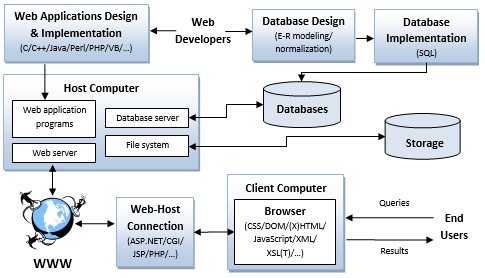CSci260 .NET and Web Programming
(a programming-intensive and no-nonsense course)
School of Electrical Engineering and Computer Science, University of North Dakota
Fall 2019
| Class times: | 03:30pm – 04:45pm, TuTh |
|---|---|
| Classroom: | Collaborative Energy Complex 205 |
| Credit hours: | 3 |
| Prerequisite: | CSci161 Computer Science II or consent of instructor |
| Class pages: | http://undcemcs01.und.edu/~wen.chen.hu/course/260/ |
| Instructor: | Wen-Chen Hu (my teaching philosophy) |
| Email: | wenchen@cs.und.edu |
| Office: | Upson II 366K |
| Office hours: | 02:00pm – 03:00pm, MoWeFr, or simply dropping in |
| Remark I: | Definitions, terminologies, and theories will be discussed minimally in this course. Instead practical works and programming knowledge will be emphasized and enforced. |
| Remark II: | This is a fundamental web course using ASP.NET and Access databases. For an advanced web course, check CSci457 Electronic Commerce Systems using LAMP (Linux, Apache, MySQL, and PHP). |
| Remark III: | Online asynchronous is also provided for the distance students. It is conducted fully through Internet instruction. For details, check UND Online & Distance Education or DEDP (Distance Engineering Degree Program). Besides, YuJa is used for hosting and sharing lecture videos, and ProctorU is used to monitor the exams. |
| Instructor’s qualification: |
The instructor initiated a database-driven web system by using Perl and Sybase in 1997, when not many people were familiar with the Web. Ever since, numerous software and tools such as ASP.NET, LAMP, and Oracle have been used by him to build various web systems. In addition, the instructor has been teaching this course for more than 10 years. |
DESCRIPTION: An introduction to Microsoft .NET and World Wide Web programming for fundamental web content development. Topics including, but not limited to:
- Microsoft .NET concepts,
- The World Wide Web basics,
- web system structures,
- client-side languages and environments such as (X)HTML and CSS,
- server-side languages and environments such as ASP.NET and C#,
- databases and structured query language (SQL),
- web-host-database connection,
- web content design and development, and
- technology survey.

OBJECTIVES: After taking this course, students are able to achieve the following goals, but not limited to:
- knowledge of web markup language principles,
- knowledge of C# language principles,
- knowledge of ASP.NET environment principles,
- proficiency in web content design and development, and
- fundamental knowledge of Microsoft .NET and web system structures.
EVALUATIONS:
Four programming exercises: 1. HTML —— 05% (campus) / 06% (online) 2. CSS —— 05% (campus) / 06% (online) 3. ASP.NET (single user) —— 12% (campus) / 14% (online) 4. ASP.NET (multiple users) —— 16% (campus) / 20% (online) Two exams —— 18% (campus) / 18% (online) each Final exam —— 18% (campus) / 18% (online) Attendance —— 08% (campus) / 0% (online)
TENTATIVE SCHEDULE:
Week 1 —— Introduction
Weeks 2 - 3 —— (X)HTML [(eXtensible) HyperText Markup Language]
Weeks 4 - 5 —— CSS (Cascading Style Sheet)
Week 6 —— Programming exercises III & IV
Week 7 —— Databases and SQL (Structured Query Language)
Weeks 8 - 9 —— Microsoft C# for ASP.NET
Weeks 10 - 14 —— Microsoft ASP.NET
Week 15 —— The World Wide Web concepts
Week 16 —— Microsoft .NET introduction
DISHONESTY: Under no circumstances will acts of academic dishonesty be tolerated. Any suspected incidents of dishonesty will be promptly referred to the Assistant Dean of Students. Refer to the Code of Student Life, Appendix B.2: Academic Dishonesty.
DISABILITY: Students who need special accommodations for learning or who have special needs are invited to share these concerns or requests with the instructor as soon as possible.